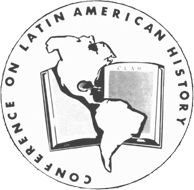Historical Notes
HISTORICAL NOTES on the Conference on Latin American History, 1926 to the 1960s
(from the CLAH Newsletter, Fall 1996)
By Frank Robinson, Auburn University
The Hispanic American History Group, responding to a perception among some historians that greater efforts needed to be made to foster the study of Latin American history, held a dinner meeting in connection with the annual meeting of the American Historical Association in Rochester, NY, on December 30, 1926. With Dr. James A. Robertson presiding and with Dr. N. Andrew N. Cleven serving as secretary, the meeting began with a plea for financial support for the Hispanic American Historical Review.
Afterward, those present discussed “Means and Methods of Widening among Colleges and Universities an Interest in the Study of Hispanic American History.” Several scholars expressed opposition to the founding of a formal organization, and a few even questioned whether Latin American history stood independently as a legitimate subject of inquiry. Nevertheless, a majority number believed the dinner gathering a profitable experience and decided to formalize the event.
At a luncheon conference of the Hispanic American History Group of the American Historical Association in 1928, a special committee appointed the previous year suggested that the annual gathering should adopt the name Conference on Hispanic American History. Although all the issues pertaining to the establishment of a permanent organization had not been resolved, a basic framework for CLAH had been set.
The Conference on Latin American History was founded at a time when small but perceptible changes were occurring in relations between the United States and Latin America. For example, President Calvin Coolidge and his Secretary of State Frank B. Kellogg in 1926 spoke publicly in support of Spanish language training and the study of Latin American history. The founding of CLAH reflected a heightened scholarly commitment to furthering the study and teaching of Latin American history and a desire to encourage the diffusion of knowledge about the region and its people.
At a business meeting held in Chicago, after the annual luncheon on December 28, 1938, a constitution consisting of six articles, drafted by a committee chaired by Professor Charles W. Hackett, was adopted. This charter changed the organization’s name to the Conference on Latin American History; stated that the primary work of the conference was to assist the program committee of the AHA in preparing the Latin American sessions at the annual meeting; and opened membership to all persons interested in the history and culture of Latin America.
Although many distinguished scholars attended CLAH’s annual luncheons, business meetings, and academic sessions, membership in the organization by 1948 remained limited to the seventy-six members who had enrolled that year by paying their one dollar dues.
In 1954, the Conference acted to further stabilize its institutional framework by revising the Constitution of 1938 and expanding the number of officers. Exceptional leadership from the Conference Chairpersons during the 1950s and 1960s guided CLAH, as the organization grew more mature and complex.
The year 1964 represented a turning point in CLAH’s development and evolution. Howard F. Cline, as Director of the Hispanic Foundation of the Library of Congress, played an important role in incorporating CLAH under the laws of the District of Columbia, thereby establishing the Conference as a legal entity separate from the AHA. The act of incorporation aimed at resolving an awkward relationship between the Conference and its parent organization. By ending its direct relation to the larger Association, CLAH now stood with the AHA on equal terms as an affiliated but autonomous body. Although conflicts in subsequent years have arisen concerning the annual selection of panels and the authority of the AHA program committee, CLAH, as a model to other affiliated societies and sister organizations, has sought to maintain amicable relations with the AHA in the hope of strengthening the profession overall.
Another noteworthy event occurred during 1964, when the Secretariat of CLAH found a more permanent home at the Hispanic Foundation in the Library of Congress. Previously, CLAH’s records and files had been kept in a black suitcase which literally changed hands every time a new Secretary-Treasurer was selected. Housing the Secretariat at the Library of Congress meant better organization, indirect financial support, and more systematic recording of Conference business.
Later, in December 1964, CLAH, through the AHA, received $125,000 from the Ford Foundation for projects and activities relating to the preparation of materials to aid in research and teaching. Divided among several different programs, these funds helped ensure the success of the Conference on Latin American History Publications series, published until 1976 by the University of Texas Press and subsequently by the University of Wisconsin Press. Designed to serve as tools for reference and scholarly research, the first of the six books currently in the series appeared in July 1967.
In recent years the Conference has continued to expand its range of activities. Growing membership lists and widening scope of historical inquiry prompted the General Committee to gradually increase the number of regional committees to carry out approved programs. The CLAH Newsletter, a primary responsibility of the Secretariat, first appeared at regular intervals in 1965 and has since become an indispensable source for reporting institutional news, personal and professional notes, and updates on research and publications. CLAH’s efforts to recognize and reward superior scholarship have also grown over the years, and the Conference now offers ten major prizes and awards for exemplary service and research in the field of Latin American history.
The members of CLAH should be proud of their organization’s achievements over the last seventy years. The dedicated efforts of its leaders and the support of its members have enabled CLAH to successfully advance the image of Latin American history within the profession, and, as an international professional association, CLAH has succeeded in its mission to further scholarly pursuits in the field of Latin American history.
